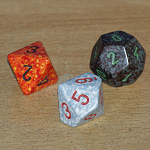 Some recent attempts by one or two outspoken and polarising game designers to rewrite history has brought up an old post from 2009 chronicling the rise and fall of RPG Theory.
Some recent attempts by one or two outspoken and polarising game designers to rewrite history has brought up an old post from 2009 chronicling the rise and fall of RPG Theory.
In short, RPG theory is a load of cobblers.
It started out with a handful of uncontroversial truths. It’s true that specific game mechanics encouraging certain styles of play. And having setting and rule elements that reinforce one another tends to result in a better game; we can all name plenty of games that failed due to a mismatch between the game mechanics and the setting. And baroque cruft-ridden complexity in either rules or setting is not a good thing.
But Ron Edwards and The Forge took it way beyond that, building a massive pseudo-intellectual house of cards out of incomprehensible jargon and undisguised contempt both for the vast majority of successful games and the people who actually enjoyed playing them. They styled themselves as the RPG equivalent of the punk movement in music, overthrowing what they considered as the pompous and overblown games of the generation before. But it was a punk movement without the equivalent of any three minute bursts of stripped-down primal rock’n'roll, which was ultimately the only good thing about Punk. Imagine no “Anarchy in the UK”, but keeping Sounds’ infamous one-star review of Pink Floyd’s “The Wall” and the iconoclastic bloviating of Julie Burchill and Tony Parsons. That was The Forge.
Saying that, I own and have played a few of the small-press games that came out of The Forge, and there were some enjoyable one-shot games of Inspectres and Primetime Adventures at Stabcons. But when you look at what actually happened in the game sessions the play experience wasn’t radically different from many a more traditional game. But none of these games really gave the impression they had the depth needed to sustain a satisfying long-term campaign, and more importantly none of them ever seemed to be much more that fifteen-minute wonders. Are there still people playing “Dogs in the Vineyard” in 2015?
A decade on it’s an open question as to the lasting influence of The Forge. Did Ron Edwards’ notoriety obscure more subtle influences on following generations of games? Or was The Forge largely irrelevant to people who make and play games rather than just talk about them on the internet? Certainly many have suggested the success of the fifth edition of Dungeons & Dragons was down to their purging of Forgeist taint that had allegedly ruined the fourth edition. I’m not entirely convinced of that one myself. But do other successful games like FATE or Cortex Plus rely some of the “narrativist” ideas, or did they just develop independently?
And who was responsible for killing off GURPS?